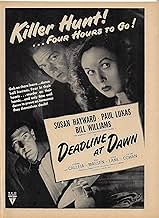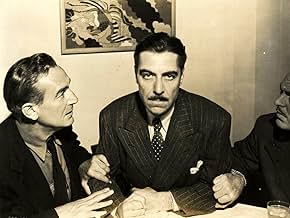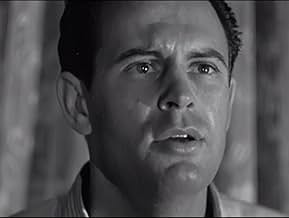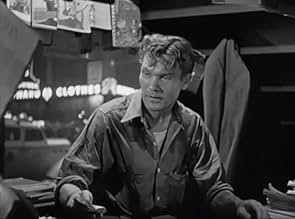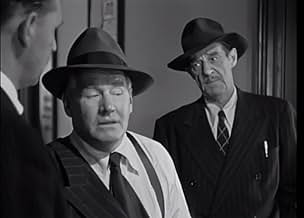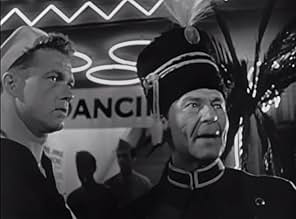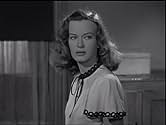IMDb RATING
6.8/10
2.5K
YOUR RATING
After a woman he meets is murdered, a soon-to-ship-out sailor has until dawn to find the killer, aided by a weary dance hall girl.After a woman he meets is murdered, a soon-to-ship-out sailor has until dawn to find the killer, aided by a weary dance hall girl.After a woman he meets is murdered, a soon-to-ship-out sailor has until dawn to find the killer, aided by a weary dance hall girl.
- Directors
- Writers
- Stars
- Awards
- 1 nomination total
Ernie Adams
- Waiter
- (uncredited)
Fred Aldrich
- Beefy Nightclub Guest
- (uncredited)
Walter Bacon
- Commuter
- (uncredited)
John Barton
- One-Legged Man
- (uncredited)
Billy Bletcher
- Waiter
- (uncredited)
- Directors
- Writers
- All cast & crew
- Production, box office & more at IMDbPro
Featured reviews
Explosive lighting by cinematographer Nick Murasaca; a twisty, turning plot by mystery writer Cornell Woolrich; literate dialogue with heart from playwright Clifford Odets; and an estimable ensemble cast of fine character actors, plus a young, beautiful, and surprisingly effective Susan Hayward -- it all adds up to make this a little film noir gem.
It's a very New York piece, though it's also an example of RKO Pictures at its Hollywood best. And yet, for a film noir, there's a surprising sweetness, a current of innocence personified by the sailor boy accused of murder in a nocturnal urban jungle of violence, betrayal and corruption.
Highly recommended.
It's a very New York piece, though it's also an example of RKO Pictures at its Hollywood best. And yet, for a film noir, there's a surprising sweetness, a current of innocence personified by the sailor boy accused of murder in a nocturnal urban jungle of violence, betrayal and corruption.
Highly recommended.
Terrific performances by many actors make this 1946 noir a joy to watch. Nifty murder mystery directed by Harold Clurman and written by Clifford Odets. As mentioned elsewhere on this board the dialog is wondrous; you never know what anyone will say, and everyone seems to "wax philosophic" throughout the film.
The action follows a murder of a woman and how it involves a sailor on leave, a dance-hall girl, and a taxi driver. The story takes place on a sweltering New York night in the early hours. The sailor must catch a 6 AM bus, so there's the "deadline at dawn." As the protagonists track down clues, they run across a bizarre collection of shady types, and everyone seems to to capable of murder, especially of this particular woman.
Susan Hayward gives a stunning performance as June. She starts out as a wisecracking and downhearted taxi dancer who resists getting involved but can't help herself since the sailor (Bill Williams) seems so innocent and naive. She calls him Boob McNutt. As they race around the city tracking down clues (this city never sleeps) they meet a world-weary taxi driver (Paul Lukas) who helps out. All three stars give amazing performances here.
Supporting players are also a knockout with Lola Lane terrific as the victim, Joseph Calleia as her creepy brother, Osa Masson (with a limp), and Marvin Miller, Jerone Cowan, Constance Worth, Al Bridge, Steven Geray, Joseph Crehan and others all solid.
Odets' writing is excellent even if all the characters seem to talk in the same poetic language. But it becomes mesmerizing as the characters seek the truth and talk. It seems that everyone is city wise but a poet at heart.
Hayward looks great with her hair pinned up (it's a sultry night) with bobby pins. She wears little makeup. Williams is also wonderful as the sailor who's not quite as dumb as he seems. Lukas is also solid as the surprising taxi driver.
Great film noir with touches of poetry and humor. What more could you want?
The action follows a murder of a woman and how it involves a sailor on leave, a dance-hall girl, and a taxi driver. The story takes place on a sweltering New York night in the early hours. The sailor must catch a 6 AM bus, so there's the "deadline at dawn." As the protagonists track down clues, they run across a bizarre collection of shady types, and everyone seems to to capable of murder, especially of this particular woman.
Susan Hayward gives a stunning performance as June. She starts out as a wisecracking and downhearted taxi dancer who resists getting involved but can't help herself since the sailor (Bill Williams) seems so innocent and naive. She calls him Boob McNutt. As they race around the city tracking down clues (this city never sleeps) they meet a world-weary taxi driver (Paul Lukas) who helps out. All three stars give amazing performances here.
Supporting players are also a knockout with Lola Lane terrific as the victim, Joseph Calleia as her creepy brother, Osa Masson (with a limp), and Marvin Miller, Jerone Cowan, Constance Worth, Al Bridge, Steven Geray, Joseph Crehan and others all solid.
Odets' writing is excellent even if all the characters seem to talk in the same poetic language. But it becomes mesmerizing as the characters seek the truth and talk. It seems that everyone is city wise but a poet at heart.
Hayward looks great with her hair pinned up (it's a sultry night) with bobby pins. She wears little makeup. Williams is also wonderful as the sailor who's not quite as dumb as he seems. Lukas is also solid as the surprising taxi driver.
Great film noir with touches of poetry and humor. What more could you want?
This is a strange little movie, which I'm sure is primarily due to Clifford Odets bizarre screenplay, but I freely admit that I really enjoyed it! The plot is somewhat convoluted (although not as hard to follow as some make out) and the ending is a little 'feel good' for a noir but Odets' dialog is what will bring you into it - or push you out. I still can't figure if the way his characters speak is closer to real life than 'regular' movie dialog, or nothing at all like anyone speaks; it somehow manages to be a little of both. One thing for sure is this is not how people normally speak in movies. Strong performances by Susan Hayward and Paul Lukas contribute to the fun; and that's what I found it to be. You've got likable characters, clever dialog, a mystery to solve before dawn, and Susan Hayward looking as good as I can remember. What else do you need?
A decent story based on a novel by Cornell Woolrich, good performances, and snappy dialogue by Clifford Odets elevate "Deadline at Dawn" from 1946. A small film, clocking in at 83 minutes, it packs in a lot of drama.
The film begins with a blind man (Marvin Miller, Mr. Anthony from "The Millionaire") visiting a young woman and demanding $1400 that he is owed. Next thing you know, she's dead.
A young sailor on leave, Alex, (Bill Williams) sobers up after a blackout and sees that he has a lot of money that belonged to one Edna Bartelli (Lola Lane), a girl who invited him to her home to "fix her radio."
Alex has the radio, and at a dime a dance place, he asks for help from June Goth (Susan Hayward) to help him return it. When they get to Edna's, she's dead. Alex is afraid that he did it, but he can't remember.
His leave ends in four hours, so that's all they have to find out what happened. They team up with a friendly cab driver (Paul Lukas). In their investigation, they meet a bunch of low-lifes and it becomes apparent that Edna had a few enemies.
Both Hayward and Williams give delightful performances. Hayward vacillates from the tough girl she is at the dance hall and softness as she gets to know Alex. Williams, who was TV's Kit Carson is the dad of actor William Katt ("Greatest American Hero") and the husband of Perry Mason's Barbara Hale.
True to its New York City wee small hours of the morning scenario, the film is peppered with various actors, each with his or her own story: Joseph Calleia, Osa Massen, Stephen Geray, Roman Bohen, and Constance Worth.
Harold Clurman, a theater director, directed this with an excellent idea of what it's like to be in New York City in the summer - hot, and the weirdos who come out at night.
Very entertaining, though probably too ambitious given the budget and time frame. The ending is a little convoluted.
The film begins with a blind man (Marvin Miller, Mr. Anthony from "The Millionaire") visiting a young woman and demanding $1400 that he is owed. Next thing you know, she's dead.
A young sailor on leave, Alex, (Bill Williams) sobers up after a blackout and sees that he has a lot of money that belonged to one Edna Bartelli (Lola Lane), a girl who invited him to her home to "fix her radio."
Alex has the radio, and at a dime a dance place, he asks for help from June Goth (Susan Hayward) to help him return it. When they get to Edna's, she's dead. Alex is afraid that he did it, but he can't remember.
His leave ends in four hours, so that's all they have to find out what happened. They team up with a friendly cab driver (Paul Lukas). In their investigation, they meet a bunch of low-lifes and it becomes apparent that Edna had a few enemies.
Both Hayward and Williams give delightful performances. Hayward vacillates from the tough girl she is at the dance hall and softness as she gets to know Alex. Williams, who was TV's Kit Carson is the dad of actor William Katt ("Greatest American Hero") and the husband of Perry Mason's Barbara Hale.
True to its New York City wee small hours of the morning scenario, the film is peppered with various actors, each with his or her own story: Joseph Calleia, Osa Massen, Stephen Geray, Roman Bohen, and Constance Worth.
Harold Clurman, a theater director, directed this with an excellent idea of what it's like to be in New York City in the summer - hot, and the weirdos who come out at night.
Very entertaining, though probably too ambitious given the budget and time frame. The ending is a little convoluted.
A young sailor on leave wakes up at midnight in a newsstand with bundles of money in his pockets and no recollection of his time spent with the wrong woman. Of course she turns out to be dead and he has until a bus leaves at 6am to discover the culprit or he gets the rap.
I like films with concentrated wandering, this one has it, the entire film like a slow ride across New York after hours in the backseat of a cab with windows rolled down, it's the middle of August, the macadam breathing out the day's heat again, or like lounging by the open window of your apartment with lights turned off, glimpses of strange figures stalking the empty and sweltering streets below and imagining mischief from them.
It has mood above all, latenight paranoia being sweated out from pores in the skin. Everything looks a bit unhinged in that magic-desolate way that is summer in the big city.
But this is deeply noirish in a key way, the way of the dumb guy's dream that crystallizes the essence of noir. Our man was out at night dreaming but has no recollection what about, except it involved offers of sex and illicit money. We presume he's innocent because of his naive blond looks and because he's the one telling the story, and is bewildered as he does, because more likely suspects are paraded, stories are piled, testimonies, conjecture, a drunk man uncovers hidden truth, a cab driver reflects about love, but the puzzle persists, the puzzle that is the night of life; we cannot really know, there is a blank spot at the center. Emptiness behind the stories that we make up to narrate our private worlds.
You will need no more eloquent parallel about what this is all about than a blind pianist among the suspects and being - mistakenly - sussed from his melodramatic reaction.
So we have sinister happenings back in the waking world, itself rendered as something you wake up from. Then our film as a dream attempting inner balance, so of course thick in coincidence, in strange but kind souls assisting, capped off with a miraculous revelation in the end that absolves guilt.
This is truly wonderful stuff that has burned itself into my visual imagination. It's clean and dark both, the shadows all in having traveled, having dreamed the night away.
I like films with concentrated wandering, this one has it, the entire film like a slow ride across New York after hours in the backseat of a cab with windows rolled down, it's the middle of August, the macadam breathing out the day's heat again, or like lounging by the open window of your apartment with lights turned off, glimpses of strange figures stalking the empty and sweltering streets below and imagining mischief from them.
It has mood above all, latenight paranoia being sweated out from pores in the skin. Everything looks a bit unhinged in that magic-desolate way that is summer in the big city.
But this is deeply noirish in a key way, the way of the dumb guy's dream that crystallizes the essence of noir. Our man was out at night dreaming but has no recollection what about, except it involved offers of sex and illicit money. We presume he's innocent because of his naive blond looks and because he's the one telling the story, and is bewildered as he does, because more likely suspects are paraded, stories are piled, testimonies, conjecture, a drunk man uncovers hidden truth, a cab driver reflects about love, but the puzzle persists, the puzzle that is the night of life; we cannot really know, there is a blank spot at the center. Emptiness behind the stories that we make up to narrate our private worlds.
You will need no more eloquent parallel about what this is all about than a blind pianist among the suspects and being - mistakenly - sussed from his melodramatic reaction.
So we have sinister happenings back in the waking world, itself rendered as something you wake up from. Then our film as a dream attempting inner balance, so of course thick in coincidence, in strange but kind souls assisting, capped off with a miraculous revelation in the end that absolves guilt.
This is truly wonderful stuff that has burned itself into my visual imagination. It's clean and dark both, the shadows all in having traveled, having dreamed the night away.
Did you know
- TriviaJoe Sawyer's character of washed-up baseball player Babe Dooley was based on Chicago Cubs hitting great Hack Wilson whose alcoholism led to his steep professional and personal decline.
- GoofsAt the end, the main characters exit the 8th Police Precinct. It is night, and the streets are deserted. Yet when June and Alex drive away in the police car, it can be seen through the back window of the vehicle that the streets are bustling with activity, cars, and people, and it's bright and sunny.
- Quotes
June Goffe: If you hear a peculiar noise, it's my skin creeping.
- ConnectionsFeatured in Noir Alley: Deadline at Dawn (2017)
- How long is Deadline at Dawn?Powered by Alexa
Details
- Release date
- Country of origin
- Languages
- Also known as
- Un amanecer trágico
- Filming locations
- Backlot, 20th Century Fox Studios - 10201 Pico Blvd., Century City, Los Angeles, California, USA(New York night street scenes)
- Production company
- See more company credits at IMDbPro
- Runtime
- 1h 23m(83 min)
- Color
- Aspect ratio
- 1.37 : 1
Contribute to this page
Suggest an edit or add missing content

